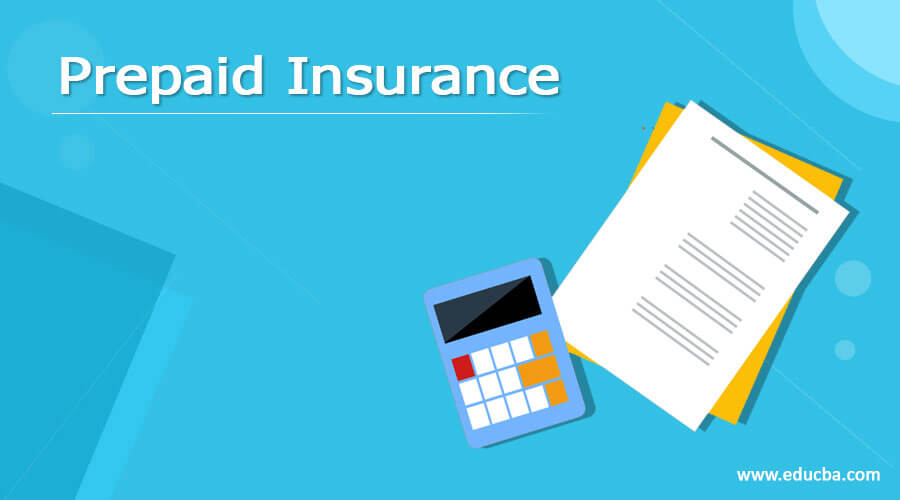Updated July 10, 2023

Definition of Prepaid Insurance
Prepaid Insurance refers to the insurance that the company pays in advance. For example, every company must pay an insurance fee to protect its assets, employees, etc. When the insurance premium is paid in advance, that is called prepaid insurance.
Explanation
Prepaid Insurance is treated as a Current asset. This is because the company has paid an expense in advance, which will help to ease the expense later. As the expense is paid beforehand, it is treated as a prepaid expense and recorded accordingly. Yearly accounting of a company is done as per financial year, so it is treated as an asset if insurance expense for the next financial year is already paid this year.
How Does It Work?
Every company pays insurance premiums either monthly, quarterly, or annually. So when a company has paid the insurance premium in advance for the next period, that extra payment is recorded as prepaid insurance on the Asset side of the Balance sheet. So every company treats it as an asset, and when the period comes, the appropriate amount is shown as an expense under the Insurance expense.
Example of Prepaid Insurance
Company XYZ is a logistic company. There are more than 500 trucks under the company’s assets, and all trucks are operational. The company is a mid-sized company, and nearly 500 employees are working for the company. Every quarter, the company pays insurance for the assets and employees. This is the 4th quarter running for the current year. The company decided to pay the interest expense of the first quarter for the next year. As the insurance will not be used until and unless the first quarter of next year arrives, it will be reflected under the Asset side of the company as prepaid insurance. It will be shown as an expense when the 1st quarter of next year arrives.
Prepaid Insurance in Balance Sheet
Prepaid Insurance is shown as an asset on the Balance Sheet. When an expense is paid in advance, the company will not have to pay it when it arises. So this is an asset to the company. The company’s Balance Sheet will reflect the expense as an asset as long as the correct period doesn’t arrive. As the correct period approaches, it will be moved from the asset side and reflected under the expense.
Prepaid Insurance Journal Entry
Company XYZ has paid an insurance expense of $500 for the next quarter. Show journal entries for the event.
Solution:
When will the insurance be paid for the next quarter?
Prepaid Insurance Account …. Debit $500
To Cash Account ………… Credit $500
(Being Prepaid Insurance Paid)
When the prepaid insurance will be expensed in the next quarter
Insurance Expense Account ……Debit $500
To Prepaid Insurance Account …….Credit $500
(Being Insurance Expense incurred)
Prepaid Insurance vs Accrued Insurance
It is an Asset that a company records on its balance sheet as the expense is paid in advance. On the other hand, Accrued Insurance is liabilities that a company should have paid but still didn’t pay. So Accrued Insurance is a liability, and the company will have to pay it to clear dues. Therefore, accrued insurance is treated as short-term liability and is shown on the balance sheet.
Advantages
Some of the advantages are given below:
- It is an asset. As the company had already paid for the expense it was supposed to pay, the advancement in payment helped the company deal with other expenses in the following period.
- As the insurance premium is paid in advance, so the company may receive a discount from the insurance company for early payment. This discount will reduce the company’s expenses and, in turn, will increase the company’s profitability.
- The company’s assets and employees will feel more secure as the company has already paid for the insurance in advance. In addition, it shows the care of the company for its employees.
- Excess cash may have the pressure to be paid off as a dividend; with the company making advance payments to insurance, the dividend-paying pressure can be tackled.
Conclusion
It is a good sign for the company, as it likes to pay off expenses before the due date. It reflects the strong earning power of the company and creates goodwill in the market. Companies that take care of assets and employees by paying reasonable advance insurance premiums are considered strong financial companies. There should always be a check regarding the period for advance in insurance. A company shouldn’t advance too much as it may reflect badly on the profitability.
Recommended Articles
This is a guide to Prepaid Insurance. Here we also discuss the definition and how does prepaid insurance work? Along with advantages. You may also have a look at the following articles to learn more –
